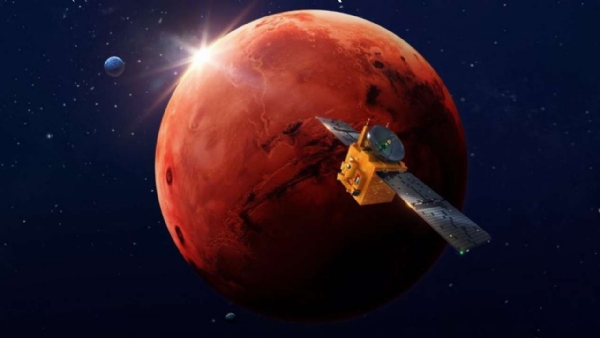UAE's Hope enters in Mars orbit; makes history
Total Views |
Abu Dhabi, February 10: The United Arab Emirates has craved its name in space history after their first-ever interplanetary Hope Probe mission successfully entered orbit around Mars on Tuesday after completing the seven-month journey.

Hope Probe's science orbit is elliptical, between 20,000 km and 43,000 km above Mars' surface and with an inclination of 25 degrees. In this orbit, the spacecraft can complete one orbit of Mars every 55 hours and will capture a full planetary sample every nine days.
With the help of the 3 scientific instruments, the Hope probe will provide a complete picture of the Martian atmosphere and its layers which will answer key questions about the global Martian atmosphere and the loss of hydrogen and oxygen gases into space over the span of one Martian year.
The Mars program is part of the UAE`s efforts to develop its scientific and technological capabilities and reduce its reliance on oil. The UAE Space Agency even has an ambitious plan for a Mars settlement by 2117.
The Hope probe was launched on 20th July 2020 through Tanegashima Space Centre, Japan. It has traveled, 493.5 Million km.
Hope Probe's science orbit is elliptical, between 20,000 km and 43,000 km above Mars' surface and with an inclination of 25 degrees. In this orbit, the spacecraft can complete one orbit of Mars every 55 hours and will capture a full planetary sample every nine days.
With this success, UAE has become the 5the country to reach Mars in the world and the 3rd country in history to reach from the first attempt.
ISRO has praised UAE’s efforts
ISRO scientists have congratulated the UAE Space Agency on the successful deployment of the probe and have revealed how it could help India’s next mars mission. R. Umamaheshwaran, Scientific Secretary at ISRO, said in a statement to UAE news agency WAM, “Data from Hope Probe on the transport of dust and its large-scale movements on Mars and results on the loss of volatiles from Mars, will be an important input as India finalises its plans for the next Indian mission to Mars."
.
.